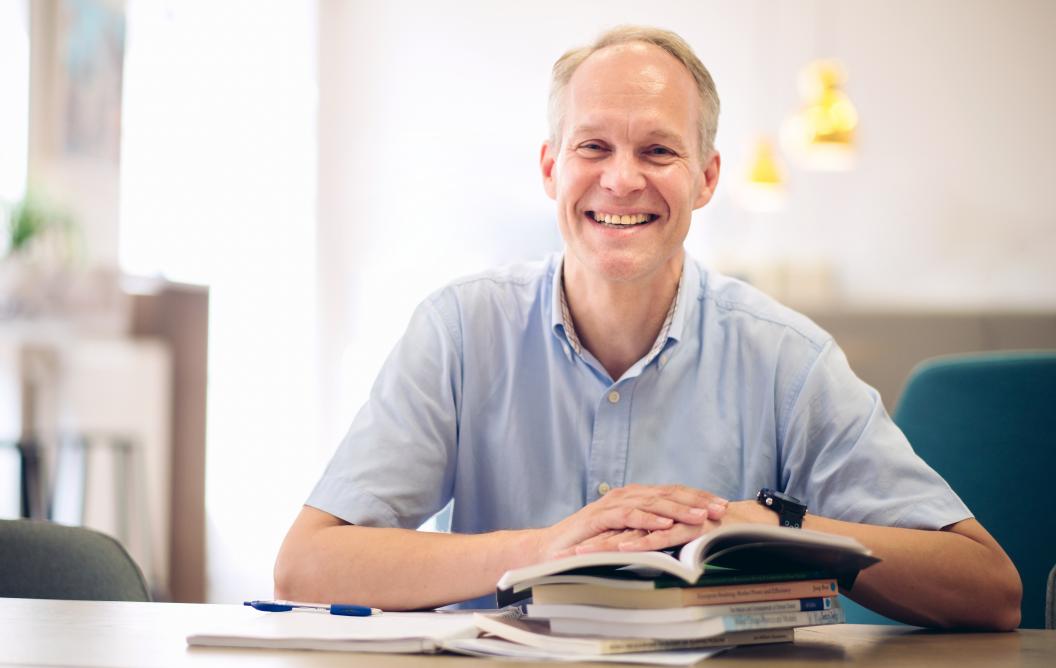Jean-Jacques Herings benoemd als Economic Theory Fellow
Jean-Jacques Herings, Professor of Microeconomics at Maastricht University, was elected Economic Theory Fellow by the Society for the Advancement of Economic Theory (SAET). Economic Theory Fellows are selected for their scientific excellence, originality and leadership; high education standards; and scholarly and creative achievement. The main qualification for the fellowship is to have substantially advanced economic theory. Among the complete list of Economic Theory Fellows to be selected since 2011, 22 are Nobel Prize winners. Professor Herings is only the second Dutch academic to receive the fellowship after his colleague Hans Peters in 2011.
Jean-Jacques Herings in the spotlight
Herings has been at Maastricht University’s School of Business and Economics since 1999. He received his PhD from Tilburg University and previously worked as a post-doctoral fellow at the Catholic University of Louvain, as an associate professor at Tilburg University, and as a visiting professor at Yale University.
Herings is a leading figure in several areas of economic theory including general equilibrium, both cooperative and non-cooperative game theory, (financial) networks, matching and computational economics.
‘Over the years, I have learned a great deal from Jean-Jacques,’ said Dr János Flesch. ‘He has excellent knowledge of his field of research. It has often struck me how quickly he is able to identify the key elements and challenges in a research project and then come up with creative and efficient ways to address them. He also has the quality to easily place and relate research questions within the existing literature.’
Since joining Maastricht University twenty years ago, Herings has had a highly fruitful career: he has served in different editorial boards including for the Journal of Mathematical Economics, the European Economic Review and the International Journal of Game Theory. He is the Secretary-Treasurer of the Game Theory Society and he has trained and promoted over 20 graduate students, many of whom have now established their own successful research careers. Furthermore, together with Arno Riedl, he successfully grew a modest department of economics into a leading group in Europe by attracting high-quality scholars from all over the world. ‘Jean-Jacques’s time-management abilities are infamous’, said Dr Arkadi Predtetchinski who has been working with Herings for the past 20 years. ‘It seems that, whereas other people have 24 hours in a day, he somehow has more.’
When speaking with his colleagues, it is clear that Herings has been a mentor to many in his department: ‘Working with Professor Herings has been a pleasure both on a professional and on a personal level,’ said Dr Christian Seel. ‘I have learned a great deal about cooperative game theory from him. At the same time, he has also taught me important soft skills such as how to supervise PhD students as well as important administrative skills for working at the faculty level.’
How economic theory contributes to society
Economists are sometimes portrayed as number crunchers hidden away in universities. However, when asked about how his field of research connects to everyday life, Professor Herings was not short of examples. ‘Network theory, for example, can be used to assess terror organisations and develop counterterror policies to detect and disrupt terrorist attacks.’ Herings also pointed to the application of matching theory to kidney transplantation. Matching theory is a branch of game theory that deals with non-price allocation. Pioneered by economist D. Gale and mathematician L.S. Shapley in the 1960s, the idea of its use gained popularity in the early 2000s with the start of kidney exchange programmes. In this case, by applying economic theories to the shortage of kidneys, scientists have been able to save lives.
‘Economic theory provides a framework for understanding what is going on in the world around us,’ explains Herings. ‘As an economist, when I see a challenge in society, I am compelled to sift through the facts to find those that reveal the essential underlying forces at play. Using mathematical models, economic theory allows us to understand the working of these forces that drive behavior.’
Lees ook
-
Jongeren in het mbo kiezen vooral op interesse. Betere koppeling met arbeidsmarktkansen nodig.
Tegen de achtergrond van de structurele arbeidsmarktkrapte is het van maatschappelijk belang dat jongeren kiezen voor studies die niet alleen aansluiten bij hun interesses en talenten, maar ook leiden tot beroepen met goede arbeidsmarktperspectieven en maatschappelijke waarde, met name in sectoren...

-
EU-subsidie voor baanbrekend onderzoek naar ethische AI voor de gezondheidszorg
Prof. Dr. Dominik Mahr en Prof. Dr. Gaby Odekerken-Schröder van de School of Business and Economics (SBE) maken deel uit van een consortium dat een Marie Skłodowska-Curie Actions-subsidie van €2,3 miljoen heeft ontvangen voor hun project JustHealth.
Dit project heeft als doel een gedekoloniseerd...

-
SBE-onderzoekers betrokken bij NWO-onderzoek naar de rol van de pensioensector in de duurzaamheidstransitie
SBE-hoogleraren Lisa Brüggen en Rob Bauer maken deel uit van een nationaal, door NWO gefinancierd initiatief dat onderzoekt hoe Nederlandse pensioenfondsen de overgang naar een duurzame samenleving kunnen versnellen. Het project van € 750.000 heeft als doel om pensioenbeleggingen af te stemmen op de...

